Key takeaways:
- Finding balance between study and relaxation is essential for mental clarity and emotional well-being; short breaks can enhance productivity and retention.
- Setting specific and achievable study goals, along with regular reflection on time management, fosters motivation and efficiency in both academic and personal growth.
- Incorporating flexibility into your routine allows for spontaneous relaxation, making it easier to adapt to your needs and enhancing the overall study experience.
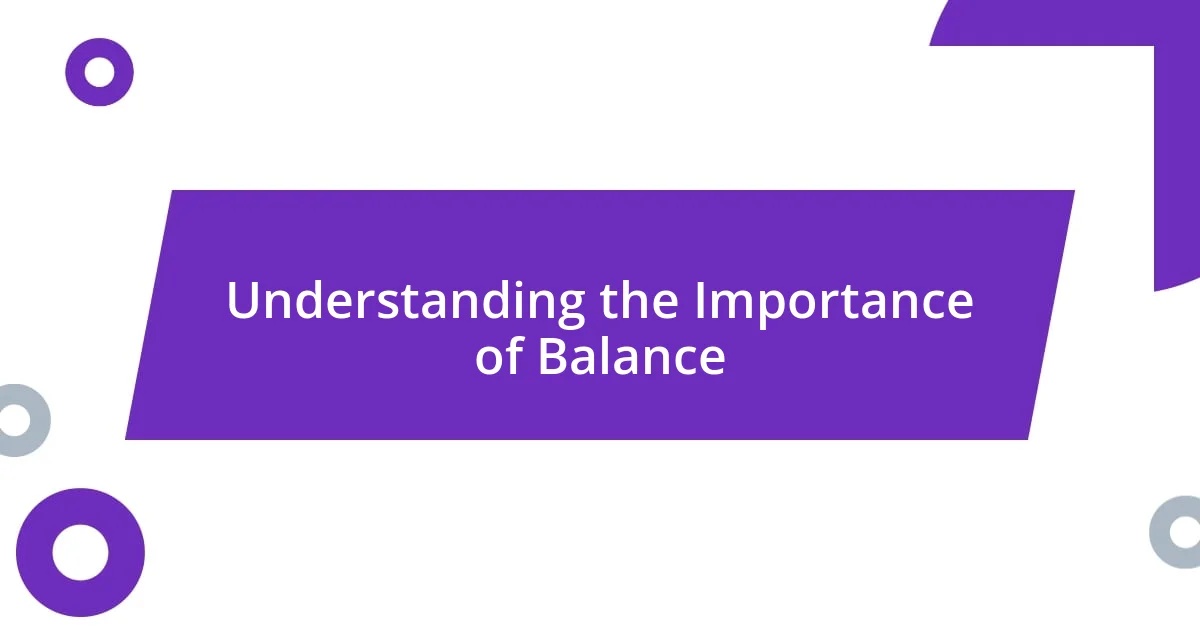
Understanding the Importance of Balance
Finding a balance between study and relaxation is crucial for maintaining both mental clarity and emotional well-being. I remember a time during exam season when I pushed myself too hard, only to feel completely burned out. It hit me then: how can I expect to absorb information when my mind is frazzled?
Balance isn’t just about dividing your time; it’s about honoring your needs. On particularly busy days, I find myself sneaking in short moments of relaxation, whether it’s a quick walk or a few deep breaths. These little pauses allow my mind to reset, reminding me that taking a step back can be just as productive as staying glued to my desk.
Have you ever noticed how a short break can make a world of difference? Personally, I’ve found that integrating relaxation into my study routine not only boosts my productivity but also enhances my retention. It’s about creating a sustainable rhythm that nurtures both your ambition and your peace of mind.

Identifying Your Study Goals
When it comes to identifying your study goals, I believe clarity is key. Setting specific, achievable goals helps to direct your efforts. For instance, during my last semester, I aimed not just to “study biology,” but to “master the concept of cellular respiration by the end of the month.” This subtle shift in wording made my objective tangible and measurable.
Creating a vision for your study goals can also mean looking beyond academics. I often include broader objectives, like improving my time management or establishing a regular study routine. One memorable goal I had was to complete my readings earlier in the week to leave space for revision — this not only helped with my grades but also gave me time to unwind over the weekends.
Ultimately, the process of articulating your goals should reflect your personal aspirations and challenges. I once learned the hard way that vague intentions lead to vague outcomes. By regularly revisiting and refining my goals, I ensure that my study efforts align with my passions and responsibilities, fostering a sense of accomplishment and motivation.
| Goal Type | Description |
|---|---|
| Academic Goals | Focus on subjects and specific content mastery. |
| Personal Development Goals | Incorporate skills like time management and stress relief. |
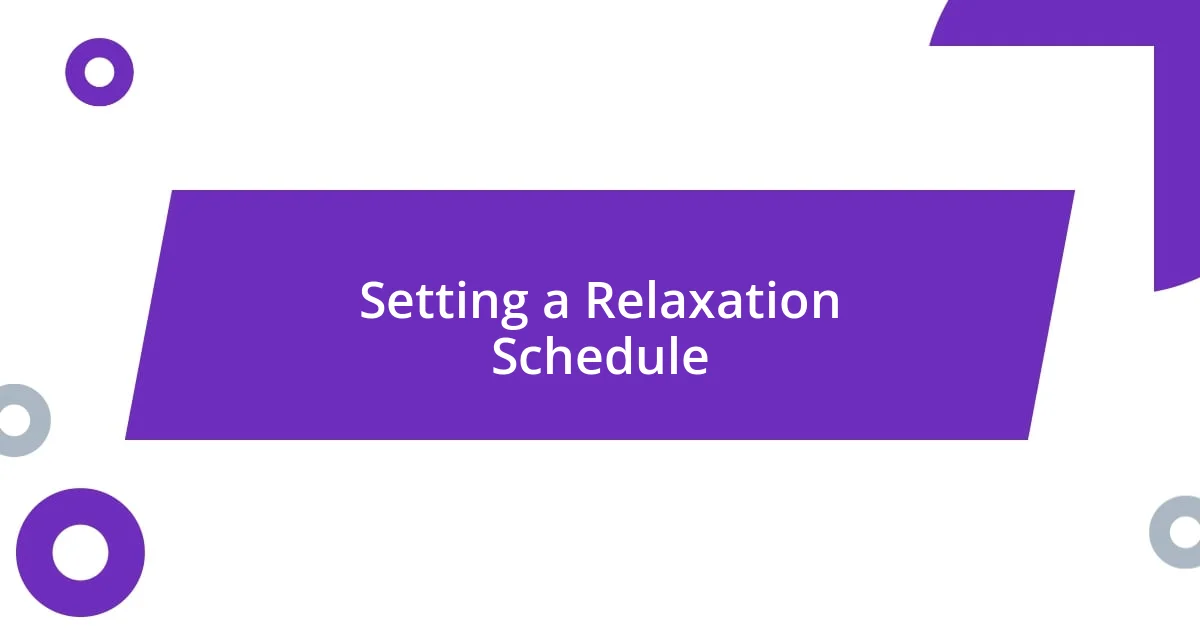
Setting a Relaxation Schedule
Setting a relaxation schedule is essential for ensuring that downtime becomes a rewarding part of my day. I’ve learned that just saying “I’m going to relax” isn’t enough; I need to carve out specific times in my busy schedule. For example, I set aside every Saturday afternoon for a couple of hours of mindfulness meditation and light reading. This very practice transformed my weekends from a chaotic blur into a nourishing retreat, rejuvenating me for the week ahead.
To create a successful relaxation schedule, consider these steps:
-
Choose Your Relaxation Activities: Identify what truly helps you unwind. Whether it’s yoga, painting, or simply listening to music, pinpoint those activities that resonate with you.
-
Time Blocks: Designate specific time blocks in your schedule for these activities. Be consistent—treat this time as you would an important meeting.
-
Incorporate Breaks: During your study sessions, integrate short five- to ten-minute breaks every hour. I find that stepping away for a moment keeps my mind fresh and focused.
-
Evaluate and Adjust: Life gets busy, and sometimes your relaxation schedule will need tweaking. I frequently reassess mine to ensure it suits my evolving needs.
In my experience, intentionally setting a relaxation schedule reshapes how I approach both work and rest. It reminds me that taking time for myself isn’t indulgent; it’s a necessity!
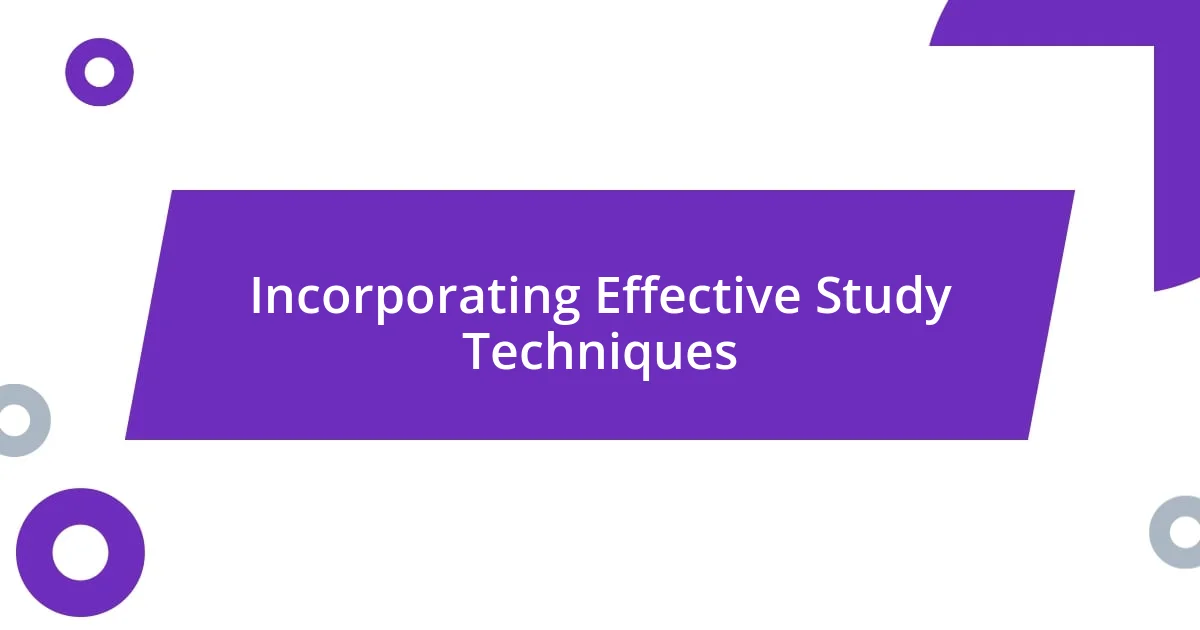
Incorporating Effective Study Techniques
Incorporating effective study techniques can be a game-changer for anyone looking to strike that elusive balance between studying and relaxing. One method I found particularly useful is the Pomodoro Technique—a time management system where you study for 25 minutes, then take a 5-minute break. I’ve noticed that this approach not only keeps my concentration sharp but also creates a sense of urgency that heightens my productivity. Have you ever experienced that peak of focus right before a break? It’s empowering!
Another technique that I swear by is creating a dedicated study environment. I remember when I first set up a small corner in my room just for studying. I added personal touches like plants and inspiring quotes. The difference was remarkable! It turned studying into a more inviting experience, and I often found myself looking forward to it. Does your study space energize you or drain you? It’s crucial to create an atmosphere that encourages focus.
Lastly, integrating active learning techniques—such as summarizing your notes or teaching concepts to a friend—has proven invaluable for retention. I often jot down summaries in my own words after finishing a chapter. This method not only reinforces my understanding but also makes the concepts feel more personal. Have you ever tried teaching a concept to someone else? You might be surprised at how much it sticks with you!
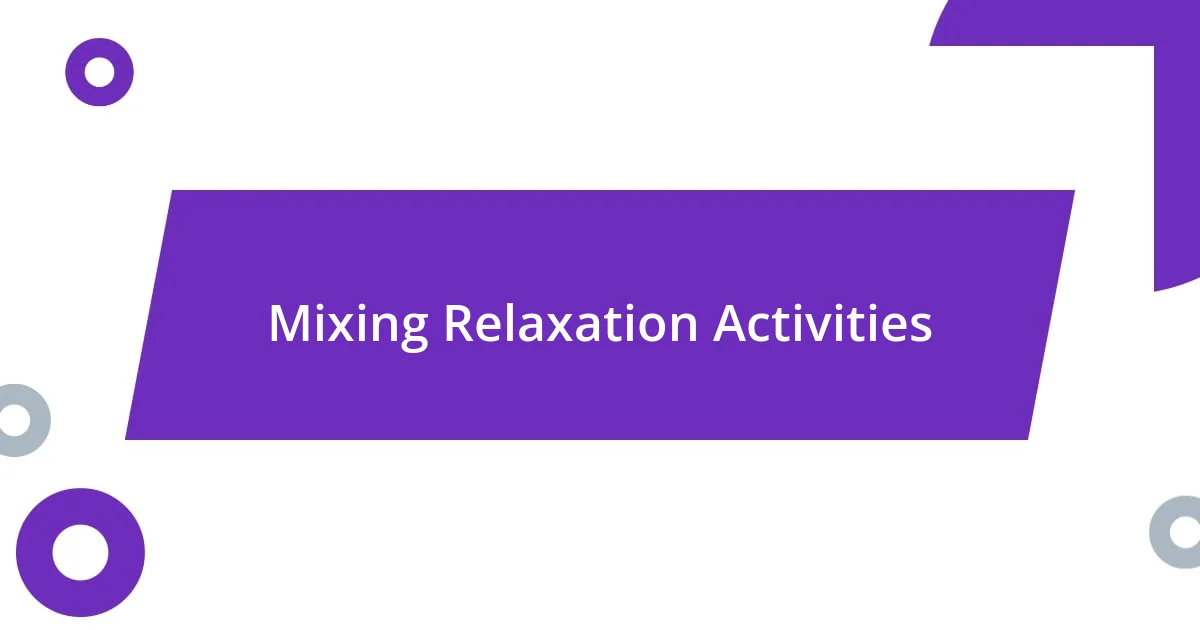
Mixing Relaxation Activities
Mixing different relaxation activities has been one of the most enjoyable discoveries for me. I love to blend physical relaxation, like gentle yoga, with creative outlets such as sketching. Picture this: after a calming yoga session, I find a cozy spot and let my pencil dance across the page. This combination not only helps clear my mind but also nurtures my inner artist. Have you ever tried pairing two seemingly different activities? It might just surprise you with how refreshing it feels!
I also find that mixing social and solitary relaxation brings a nice balance. Sometimes, I invite a friend over for a movie night, but I make it a twist by suggesting we make popcorn together and share our favorite snacks. Other times, I set aside evenings for quiet reflection with a cup of herbal tea and a good book. This way, I can enjoy the best of both worlds—connection and introspection. What activities do you think would work well together for your own relaxation time?
Moreover, I’ve realized the importance of variety in maintaining my motivation. There are days when I feel drawn to a nature walk, while other times, a soothing bath and some ambient music is all I crave. By mixing up my relaxation activities, I keep boredom at bay. This approach really highlights the significance of listening to your body’s needs. Have you noticed how sometimes your mind craves stimulation, and other times, it just wants to unwind? Tailoring your relaxation to match your mood can make all the difference!
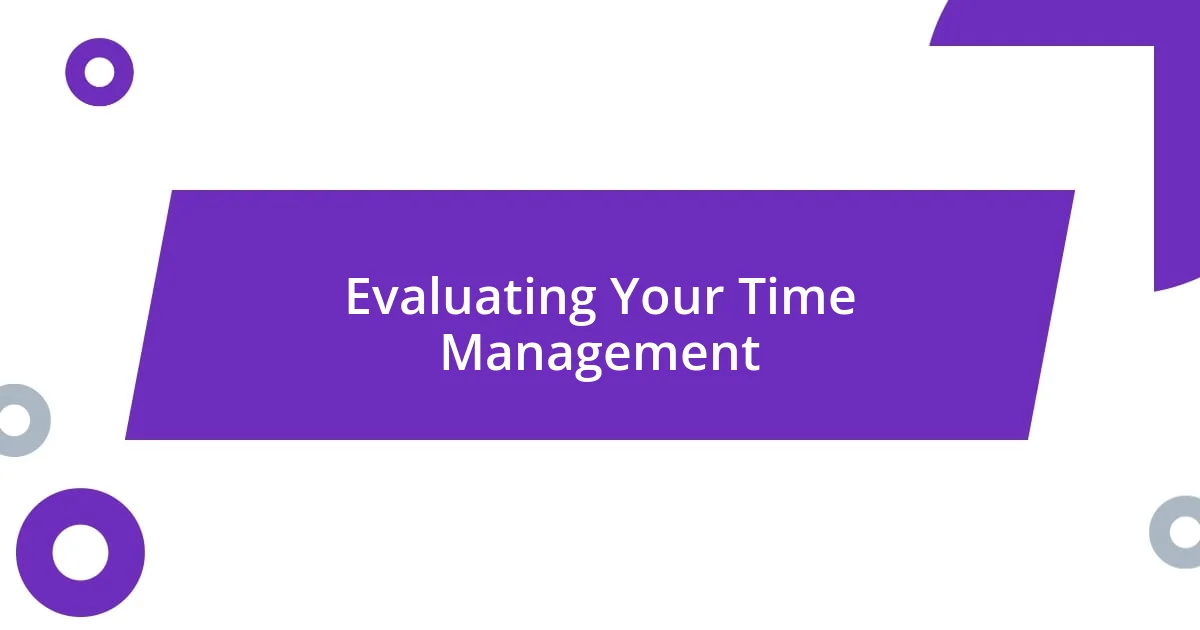
Evaluating Your Time Management
When I take a moment to evaluate my time management, it often reveals some surprising insights. For instance, last semester I found chunks of wasted time where I scrolled mindlessly through social media instead of hitting the books. After I acknowledged this habit, I set specific time limits for those distractions. Does it resonate with you when I say that sometimes we don’t even realize how those little time thieves add up?
I also love using a weekly planner, which I fill in after a quick assessment of my last week. Just recently, I noticed that my study blocks were far too sporadic, leading to unnecessary late-night cramming. It felt overwhelming and left me drained. Now that I map out my study sessions, I’ve not only reduced stress but also gained a sense of accomplishment as I check items off my to-do list. Have you tried visualizing your week to create a clearer picture of your time?
Ultimately, the key to effective time management lies in reflection. I often find myself asking, “What’s working, and what isn’t?” I remember a time when I continually studied late into the night, but it became clear that early mornings are when I’m most productive. Switching my focus made a huge impact. What about you? Reflecting on your preferences can be eye-opening and pave the way for a more balanced approach to both studying and relaxing.

Adapting Your Routine Flexibly
I’ve learned that flexibility in my routine can make all the difference in balancing study and relaxation. For example, there are days when my energy dips in the late afternoon, and instead of pushing through, I allow myself to take a short walk. This not only refreshes my mind but also helps me return to studying with renewed focus. Have you ever taken a moment to adjust your plans based on how you feel?
Adapting on the fly also means being open to spontaneous relaxation. I remember one rainy Saturday when I had a whole study schedule lined up, but the cozy sound of raindrops led me to pop up a movie instead. That decision transformed my day into a delightful blend of enjoyment and productivity. Listening to your instincts can create unexpected joy, right?
Moreover, I keep a small “flexibility jar” filled with quick relaxation options. When I find myself overwhelmed, I pull out a slip that suggests activities like journaling or a short podcast episode. It’s a fun way to remember that relaxation doesn’t have to be complicated. Have you considered ways to simplify your choices? Embracing flexibility can truly elevate your daily routine, allowing you to flow seamlessly between study and downtime.














